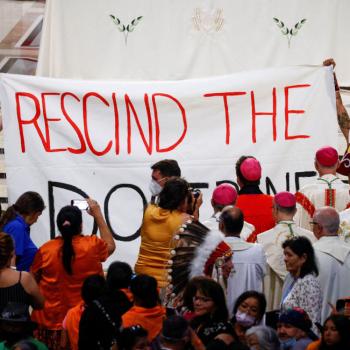
Last Sunday, the Third Sunday in Ordinary Time, I paid special attention to the reading of the Gospel from Luke. For churches, like mine, who use the common lectionary, the Gospel selection features Jesus at the beginning of his public ministry. In the synagogue at Nazareth he was handed a scroll of the prophet Isaiah. He read a passage, set the scroll down, and said, in essence, “This is a time when everyone who is in debt gets to start over.”
Earlier on that same Sunday I had read a London Guardian newspaper article about a worldwide, United Kingdom-based charity, the Jubilee Debt Campaign. The JDC advocates for poor countries with unsustainable debts. Debt payments by poor countries have more than doubled as a percent of government revenue since 2010. Now, the U.S. Federal Reserve has announced it will raise interest rates to stem inflation. The result for poor countries in debt will be that their debt payments will increase even further. The title of the Guardian article spells it out: “Fears grow that US action on inflation will trigger debt crisis.”
Seventh in a series on social justice in the Gospel of Luke.
The Jubilee Year
I don’t know if the Guardian reporter planned to publish that article on the day many Christians would hear in the Gospel both Isaiah and Jesus on forgiving debts. But some people in rich nations are beginning to think like Isaiah and Jesus.
Here’s the passage from Luke’s Gospel where you see Jesus quoting Isaiah:
[Jesus] came to Nazareth, where he had grown up, and went according to his custom into the synagogue on the Sabbath day. He stood up to read and was handed a scroll of the prophet Isaiah. He unrolled the scroll and found the passage where it was written:The Spirit of the Lord is upon me, because he has anointed me to bring glad tidings to the poor. He has sent me to proclaim liberty to captives and recovery of sight to the blind, to let the oppressed go free, and to proclaim a year acceptable to the Lord. (Luke 4:16-19)
Another name for “year acceptable to the Lord” is Jubilee. The Book of Leviticus established the Jubilee Year, a time for starting over. If you had acquired slaves over the previous 50 years, you would set them free. (That’s “liberty to captives.”) If you had incurred debts, those debts would be forgiven. Over the course of 50 years some farmers would have had to sell land to pay their debts. In the Jubilee Year each family would receive its original property back. Jesus was just beginning his ministry, and he had the audacity to proclaim a Jubilee Year on his own authority. He said,
Today this scripture passage is fulfilled in your hearing. (4:21)
Some hometown folks questioned, “Isn’t this the son of Joseph?” Meaning, Who does he think he is?
When should a debt not be repaid?
The Jubilee Debt Campaign advocates for the 5o-some countries in crisis. Their debt payments interfere with their government’s ability to insure basic economic rights. Food, shelter, healthcare, a job are out of reach for too many people.
The JDC calls for wealthy countries and private interests to undertake a “comprehensive debt cancellation scheme.” Not for all debts, of course. The Campaign advances some criteria for when debts should not have to be repaid. Two of these criteria are:
- When lenders knowingly lend money for projects unlikely to succeed, and
- When changes in circumstances cause project failure.
Both of these apply to debts incurred by poor countries. Sometimes repaying a country’s debt makes meeting people’s basic needs impossible. The Campaign insists: life itself should not come after debt payment in order of priorities.
The Campaign gives an especially egregious example of an unfair debt:
The United Kingdom lent the General Suharto’s Indonesian dictatorship money to buy tanks and warplanes. These were then used to “violently repress Indonesia’s own people.” The dictatorship fell, but the UK still insisted that the Indonesian people pay back the debt.
Rich countries like the United States have offered loans to corrupt governments of poor countries. Often it was in the creditor countries’ own commercial or political interests more than those of the countries accepting the loans. And often it was corrupt governing bodies whom the loans propped up and benefited most.
Circumstances change: climate and Covid
If circumstances ever combined to render loans unpayable and debt forgiveness morally mandatory, it is the combined circumstances of pandemic and global warming. International climate correspondent Somini Sengupta, writing in the New York Times, wonders:
How does a country deal with climate disasters when it’s drowning in debt? Not very well, it turns out. Especially not when a pandemic clobbers its economy.
Under pressure from academics and advocates for the poor, the World Bank and the International Monetary Fund assessed the situation:
The combination of debt, climate change and environmental degradation ‘represents a systemic risk to the global economy.’ This combination [he doesn’t even mention Covid] “may trigger a cycle that depresses revenues, increases spending and exacerbates climate and nature vulnerabilities.’
The Times article goes on to quote Kristalina Georgieva of the I.M.F., advocating for “green recovery programs.” They could seed climate action in developing countries suffering from the economic impact of the pandemic.
United Nations Secretary General António Guterres called for “debt relief for a broad range of countries: “We cannot walk head on, eyes wide open, into a debt crisis that is foreseeable and preventable.”
JDC’s executive director says,
The debt crisis has already stripped countries of the resources needed to tackle the climate emergency and the continued disruption from Covid, while rising interest rates threaten to sink countries in even more debt.
Debt and Jubilee in Jesus’ time
Jubilee had been on the books since a scribe wrote the Old Testament Book of Leviticus. I don’t know if it ever was enforced. Those prescriptions included freeing slaves, forgiving debts, and returning to each family the property it had owned originally. In case of need, i.e., unrepayable debt, you could sell your land and even yourself, as a slave. But Jubilee said only for so long. Every 50 years the inevitable process of increasing separation of rich from poor would have to start over. Inequality would go only so far in that system.
It didn’t work out that way.
There was a genuine problem. John Howard Yoder in The Politics of Jesus explains: As the 50th year approached, creditors would be loath to hand out necessary loans, knowing they’d lose most of their money. Rabbis, facing a foundering economy, found a work-around. They allowed a creditor to “transfer to a court the right to recover in his name a debt which the [jubilee] year otherwise might have cancelled.” (p. 69) Sounds like a modern corporation avoiding taxes.
In Jesus’ day Yoder says, “Most of the former rural property owners had lost their independence.” (p. 72) With Temple tax, Roman tax, an abusive tax-collecting system, and needing to borrow money to buy seed, a farmer couldn’t get ahead. A poor year or two and he’d have to sell off his land and himself into slavery.
Then he’d be working land that belonged to another, paying rent in addition to taxes. Only a miraculous harvest would allow him to buy back his land. Jesus told a parable about just such a harvest, 30-, 26-, and 100-fold. But now, with the Jubilee that Jesus proclaimed, the farmer gets his land back for free and his freedom as well.
Another parable
Jesus told a parable about farmers’ debts and an unjust steward. He was in charge, Yoder supposes, of collecting rents from the farmers who worked his master’s land. (p. 72-72) Like anyone in his position, the steward regularly overcharged the farmers and kept the excess. Well, he gets himself fired from his job, and now what does he do? He goes to his master’s enslaved farmers one by one and lowers their rent payments.
I always wondered how he could get away with that. A religion prof told me that he kept himself out of trouble by having the farmers themselves rewrite their promissory notes. I don’t think that solves anything. Probably it just creates new problems for the farmers. Yoder explains that the steward was just lowering the bill to what it should have been. He’s finally being honest. The master isn’t missing any payment, and now the steward has new and very grateful friends he can go to for help.
Jesus doesn’t seem to be making any judgment on justice or injustice for the farmers in this story. Still, we can see that their situation was on his mind. What he thought about debt comes across clearly in the prayer he taught his disciples.
The Lord’s Prayer
In the “Lord’s Prayer” we pray for God’s kingdom to come “on earth as in heaven.” For the Jews one image of that kingdom was the Jubilee Year with its forgiveness of debts. As if to make that clear, Jesus adds to the prayer’s petitions, in Yoder’s translation:
Remit us our debts as we also have remitted them to our debtors.” (p.66)
More faithful to the Greek (and the Latin I sang in the old Catholic Mass) is:
Forgive us our sins as we ourselves forgive everyone in debt to us. (New American Bible translation)
The traditional Catholic (and Methodist and Anglican) “Forgive us our trespasses as we forgive those who trespass against us” misses an important point. Jesus expects people to forgive debts, at least during the Jubilee Year.
We could change the Lord’s Prayer to what the disciples heard from Jesus’ lips, but it wouldn’t be the same. Debt doesn’t mean for us what it meant for ancient Jewish peasants. We are long past the unenlightened days of imprisoning people for unpaid debts. Bankruptcy laws protect us from the worst consequences of our honest financial missteps. Jewish peasants in Jesus’ day had no such protection.
Our partially enlightened age helps individuals, sometimes, and commercial enterprises, especially large ones, when debt gets to be too much. There are ways to restructure loans. People can file for bankruptcy and not have to worry about going to debtor’s prison. If you’re CEO of a large enough company your financial mistakes won’t result in any more dire consequences than early retirement and a golden parachute.
But none of these protections are available to countries. If a poor country had feelings, it would probably feel about debt the same way poor people in Jesus’ day did—and fear it greatly.
What happened at COP26?
Debt relief for poor countries was going to be an important topic at last fall’s COP26 climate talks. Almost 250 organizations introduced a statement calling for cancellation of their debts. Such a move is warranted because of “the larger ‘climate debt’ owed by the Global North to the Global South.” In other words, the rich global North has caused two-thirds of the world’s climate emergency, but the poor global South suffers most of the damage. While poor countries owe financial debt to the rich, rich countries owe climate debt to the poor.
Rich nations had promised $100 billion a year to strengthen poor countries defenses and mitigation efforts against climate change. President Biden a week after his inauguration recognized the world is in a “climate emergency.” He promised to “develop a climate finance plan, making strategic use of multilateral and bilateral channels and institutions.” The plan would help developing countries reduce emissions and “build resilience against the impacts of climate change.”
That $100 billion per year pledge has never been met. “Some funds are being offered,” says the Debt Jubilee Campaign. “But not nearly enough and most of it, shamefully, as new loans.” Of 59.5 billion that rich countries did provide poor countries for climate, only $12.5 billion was in grants. (Bretton Woods Project) COP26 discussed but failed to remedy the situation.
The Catholic Church and debt jubilee
The Catholic Church had already in 1999 put debt forgiveness in the context of the Old Testament Jubilee Year. Pope John Paul II wrote:
In the spirit of the book of Leviticus (25:8-12), Christians will have to raise their voice on behalf of all the poor of the world, proposing the Jubilee as an appropriate time to give thought, among other things, to reducing substantially, if not cancelling outright, the international debt which seriously threatens the future of many nations.
The bishops of the United States have written:
The tragic fact is that in trying to pay their debts, the neediest countries are sacrificing their future and the lives of millions of their people to contribute capital to the richest countries through debt service and debt payment.
In Economic Justice for All, we restated the classic principles of justice: Commutative justice calls for fundamental fairness in all agreements and exchanges between individuals or private social groups. Distributive justice requires that the allocation of income, wealth, and power in society be evaluated in light of its effects on persons whose basic material needs are unmet. Social justice implies that persons have an obligation to be active and productive participants in the life of society and that society has a duty to enable them to participate in this way (nos. 69-71). In our view, the Third World debt crisis violates all three of these forms of justice.
One more parable, the Merciless Servant
A king was settling accounts with his slaves. One slave owed him ten thousand talents, a huge amount. Unable to pay, he begged his master, “Have patience with me and I will pay you everything.” Out of pity the king forgave the entire debt. This same slave went out and throttled a fellow slave who owed him a small sum. The latter pleaded also, “Have patience with me and I will pay you everything.” But he threw him into prison until he should pay the entire debt. Hearing of this wicked behavior, the king grew angry. He handed the slave who had owed the ten thousand talents over to the torturers until he paid the entire debt. (Matthew 18:23-35 paraphrased)
One good way to think about this parable is to imagine ourselves as in debt to God, our King. God has forgiven the huge debt that we owed because of our sin. When it’s our turn, we often refuse to forgive the minor injustices or indecencies we imagine having received from another. Yoder says that interpretation is too spiritual. (p. 67) The people who heard Jesus tell the story would know real debt for the existential threat that it was. Jesus could hardly have expected them to be thinking of anything less.
Of course, Jesus expects us to forgive “those who trespass against us.” But in this age there’s a larger forgiveness required of us. It’s not about personal sin, but it may be about sin nevertheless–systemic injustice, very likely on the part us ourselves collectively. We in the rich world are morally bound to forgive unjust debts—unjust in a number of ways, as the American bishops have said—by which poor countries are merely legally bound.











